|
|
|
Sort Order |
|
|
|
Items / Page
|
|
|
|
|
|
|
| Srl | Item |
| 1 |
ID:
113357
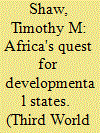

|
|
|
|
|
| Publication |
2012.
|
| Summary/Abstract |
After a generally disappointing half-century since recapturing formal independence, at the turn of the second decade of the 21st century, Africa(s) may now be able to seize unanticipated emerging opportunities to move from `fragile' or `failed' towards `developmental' political economies. The continent displays innovations in terms of sources of finance, new regionalisms & transnational governance leading to distinctive insights for analysis & policy, both state & non-state. Its potential for renaissance is reinforced by South Africa's accession as the fifth of the BRICS at the dawn of the decade.
|
|
|
|
|
|
|
|
|
|
|
|
|
|
|
|
| 2 |
ID:
113352
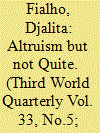

|
|
|
|
|
| Publication |
2012.
|
| Summary/Abstract |
This article provides a historical account of the creation of the ldc category in 1971, analyses the motives of the main actors and examines the motivation of the UN to establish the category. A literature review, official document analysis and expert interviews indicate that, from the perspective of both developed and more advanced developing countries, the initial ldc identification process aimed to generate a reduced list of mostly small and economically and politically less significant countries. Contrary to the official narrative, this served the interests of both developed countries (by undermining the UN's implicit effort to normalise/depoliticise international assistance) and more advanced developing countries (disturbed by the discrimination created within the developing countries' group, favouring the most disadvantaged among them).
|
|
|
|
|
|
|
|
|
|
|
|
|
|
|
|
| 3 |
ID:
113353
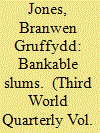

|
|
|
|
|
| Publication |
2012.
|
| Summary/Abstract |
This article develops a critical analysis of the Slum Upgrading Facility, a new initiative of UN-Habitat which seeks to improve conditions for residents of slums in Africa and elsewhere. The analysis highlights the neoliberal principles underpinning this initiative, and especially the vision of slum improvement by means of financialisation. The article argues that it is necessary and important to recognise the politics of international urban development and housing, which has since the 1970s increasingly emphasised neoliberal principles of private property and market institutions. The novel ambition of financialisation must also be situated in relation to historical transformations of housing finance in Anglo-American capitalism over the past three decades. After situating the ideological principles underpinning the Slum Upgrading Facility in these longer and broader global trajectories of international policy, the final section returns to the present to examine other initiatives currently being pursued alongside slum upgrading: the active promotion of mortgage markets in Africa.
|
|
|
|
|
|
|
|
|
|
|
|
|
|
|
|
| 4 |
ID:
113358
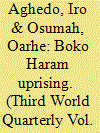

|
|
|
|
|
| Publication |
2012.
|
| Summary/Abstract |
Since the execution of Osama bin Laden and a few other al-Qaeda kingpins, the incidence of international terrorism seems to be on the decline and the 'war on terror' has been applauded as a huge success, with some even arguing that terrorism will fizzle out sooner rather than later. But recent experiences in Nigeria and some other African states reveal that, while global terrorism may be on the decline, the proliferation and radicalisation of local terrorist groups with possible links to al-Qaeda seem to be on the rise. The quest for effective counter-terrorism therefore continues. This article interrogates how Nigeria should respond to the Boko Haram terrorist uprising. Methodologically it relies on both primary and secondary sources of data. It provides an overview of the evolution and dynamics of the uprising in Nigeria, and explores the motivations, strategic operations and responses of Boko Haram. The article shows that the uprising, which engenders general insecurity, is a consequence of governance failure and institutional fragility. Thus, it concludes that, to effectively address the uprising, Nigeria should adopt a human security approach rather than the current emphasis on a repressive state security approach.
|
|
|
|
|
|
|
|
|
|
|
|
|
|
|
|
| 5 |
ID:
113363


|
|
|
|
|
| Publication |
2012.
|
| Summary/Abstract |
This article analyses Middle Eastern authoritarianism and the contemporary political transformations which have swept the region. It suggests that, given the uneven spread of reform and the selectiveness of international intervention, the prioritisation of Middle Eastern stability over democratic transformation, combined with local authoritarian regimes' ability to use excessive force against their own populations and insurgents, are responsible for the persistence of the Middle East's post-cold war authoritarianism. The recent uprisings and reform movements can be explained from the perspective of historical grievance, based on social inequality and ethnic, sectarian, tribal or sectional disparities, as well as by advancements in communications technology and economic globalisation that have undermined long-standing national authoritarianism in favour of Middle Eastern civil rights and civil society movements. A global democratic consciousness has played a decisive role in providing ideological cohesiveness and (uneven) global political support to safeguard the collective action of the new civil rights movements. Recognising that democracy itself may have characteristic regional forms with greater and lesser tinges of recurrent authoritarianism, Middle Eastern democratic transformation hinges on the ability of these burgeoning movements to achieve a civic state and overcome authoritarian counter-resistance and international suspicion and fear.
|
|
|
|
|
|
|
|
|
|
|
|
|
|
|
|
| 6 |
ID:
113362
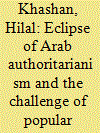

|
|
|
|
|
| Publication |
2012.
|
| Summary/Abstract |
This paper proposes that the tumultuous events associated with the Arab uprisings are unlikely to engender democracy in the foreseeable future. At best, they will probably produce unstable political orders on the basis of accommodation and ad hoc political alliances. The argument of this paper lends itself to analysis through the examination of Arabs' experience with (1) failed reforms, (2) regime defiance, (3) the gap between youth awakening and sociopolitical reality and (4) the uneasy encounter between nascent competence, confidence and political consensus. The author's assessment suggests that recent dramatic developments in the Arab region are only the beginning of a long process of political evolution that is unlikely to be concluded before the successful resolution of the issue of political identity and the transformation of Arab publics from subjects into citizens.
|
|
|
|
|
|
|
|
|
|
|
|
|
|
|
|
| 7 |
ID:
113355


|
|
|
|
|
| Publication |
2012.
|
| Summary/Abstract |
In the context of knowledge-intensive globalisation and severe poverty, policy makers in the South face various educational planning dilemmas. These are ultimately political, implying that there are no ways of avoiding tensions and trade-offs when attempting to handle them. Such dilemmas have been subject to debate in the research community and have been framed differently in different historical contexts. The contemporary development policy discourse, however, largely conceals the existence of dilemmas by suggesting that we have reached a global consensus regarding the role of education in development. This article illustrates that this consensus is imaginary and consequently aims to reframe educational planning dilemmas in the contemporary policy context. It is shown that the dilemmas have changed character and now largely revolve around how to navigate and negotiate in highly complex political landscapes. Future research should focus on such ongoing wars of position and expose the many tensions concealed by the hegemonic policy discourse.
|
|
|
|
|
|
|
|
|
|
|
|
|
|
|
|
| 8 |
ID:
113364


|
|
|
|
|
| Publication |
2012.
|
| Summary/Abstract |
Business now plays an increasingly prominent role in development. While the implicit links between private actors and international development institutions have been widely debated, the explicit role of financial corporations in shaping official development policy has been less well documented. We employ a feminist Marxian analysis to examine the material and discursive landscape of the 2012 World Development Report: Gender Equality and Development. Its exclusive focus on gender equality as 'smart economics', and the central role accorded to leading financial corporations like Goldman Sachs in the formulation of the key World Bank recommendations enable us to explore the changing landscape of the neoliberal corporatisation of development. We argue, first, that the apolitical and ahistorical representation of gender and gender equality in the wdr serves to normalise spaces of informality and insecurity, thereby expunging neoliberal-led capitalist relations of exploitation and domination, which characterise the social context in which many women in the global South live. Second, the wdr represents the interest of corporations in transforming the formerly excluded segments of the South (women) into consumers and entrepreneurs. The wdr thus represents an attempt by the World Bank and its 'partners' to deepen and consolidate the fundamental values and tenets of capitalist interests.
|
|
|
|
|
|
|
|
|
|
|
|
|
|
|
|
| 9 |
ID:
113354
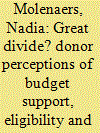

|
|
|
|
|
| Publication |
2012.
|
| Summary/Abstract |
Budget Support (bs) has been considered the aid modality that best realises the Paris Declaration principles of alignment, harmonisation and respect for recipient ownership. In design the modality has a very strong technocratic focus, and the oecd/dac has endorsed the idea that bs should be delinked from broader political concerns. In reality, however, donors do use bs to leverage more and better democratic governance. This political use of bs is not limited to exceptional moments when the political situation seriously deteriorates in certain countries. This article shows that such use is grounded in fundamentally different visions and policies that donors hold regarding the scope of leverage for bs. Such starkly diverging interpretations of which reforms bs can 'buy' undermine the objectives the modality was designed to achieve.
|
|
|
|
|
|
|
|
|
|
|
|
|
|
|
|
| 10 |
ID:
113360


|
|
|
|
|
| Publication |
2012.
|
| Summary/Abstract |
The 2008 subprime crisis led to a global wave of bailouts and other political-economic measures by governments. These moves were seen as the rise of a new statism. Emerging giants, such as Brazil, introduced new growth policies and reinforced state-crediting of corporations. This article briefly discusses key institutional, structural and ideological lineages and dilemmas in post-2008 statism and capitalism in Brazil. Neo-mercantilist capitalism is visible, for example, in the new 'National Champions' strategy aiming to create export-focused, leading global-sector corporations via mergers orchestrated by key politicians, capitalists and state financial institutions. Changes after a bailout-merger in the paper industry suggest that, after the 2008 financial crisis, in Brazil as elsewhere the use of public funds has had multiple and complex impacts, including the saving of corporations, the concentration of power in those best connected in the political economy, and further exacerbation of class-based inequalities in economic decision making.
|
|
|
|
|
|
|
|
|
|
|
|
|
|
|
|
| 11 |
ID:
113361


|
|
|
|
|
| Publication |
2012.
|
| Summary/Abstract |
Brazil's influence is rising quickly in international affairs. Unlike those of China and India, its foreign policy relies heavily on non-military power-a characteristic of Brazil since at least the early 20th century. A mainstay of this policy has been the pursuit of 'development' for Brazil and the global South, with domestic discourse on the need to 'develop' buttressing this approach. Foreign policy under President Lula (2003-10) did this explicitly; President Rousseff (2011-) shows no signs of changing course. This article analyses three foreign policy issues-South-South cooperation, health, and environment-to demonstrate the use and assess the value of this strategy. Not only is the strategy serving Brazil's national interests well, the analysis reveals, but it is also benefitting other developing countries (albeit asymmetrically), reinforcing Brazil's capacity to influence international affairs.
|
|
|
|
|
|
|
|
|
|
|
|
|
|
|
|
| 12 |
ID:
113359


|
|
|
|
|
| Publication |
2012.
|
| Summary/Abstract |
This study examines the news coverage of the Commonwealth Games in India in major newspapers in Australia, Canada, New Zealand and the UK. Textual analysis of news articles reveals a heavy focus on issues of mismanagement and deficiencies in game preparations, and the use of negative stereotypes of India. The article draws attention to the bias in coverage of events in developing countries and calls attention to the hegemonic function of the Western press in perpetuating old social attitudes and prejudices that undermine the success and achievements of events in developing countries like India.
|
|
|
|
|
|
|
|
|
|
|
|
|
|
|
|
| 13 |
ID:
113356


|
|
|
|
|
| Publication |
2012.
|
| Summary/Abstract |
Despite the shortcomings of the Millennium Development Goals as a development tool, they have proven to be an important communication tool that is worth preserving after 2015. Inclusion of important themes of the Millennium Declaration and elements of the capability theory is essential in a post-2015 system, as well as putting human rights and gender principles at its core. Process orientation rather than end goals could lead to 'Millennium Development Actions' with 'Progress Signs', which, represented in a circular symbol, form a 'wheel of development', complemented by a Wheel of Governance.
|
|
|
|
|
|
|
|
|
|
|
|
|
|
|
|
|
|
|
|
|